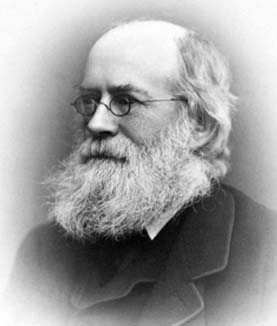


 تاريخ الرياضيات
تاريخ الرياضيات
 الرياضيات في الحضارات المختلفة
الرياضيات في الحضارات المختلفة 
 الرياضيات المتقطعة
الرياضيات المتقطعة
 الجبر
الجبر
 الهندسة
الهندسة 
 المعادلات التفاضلية و التكاملية
المعادلات التفاضلية و التكاملية 
 التحليل
التحليل
 علماء الرياضيات
علماء الرياضيات |
Read More
Date: 13-11-2016
Date: 12-11-2016
Date: 12-11-2016
|
Died: 18 Sept1913 in London, England

Samuel Roberts's father was Griffith Roberts (born about 1786) and his mother was Anna Roberts (born about 1786).
Samuel Roberts was educated at Queen Elizabeth's Grammar School in the town of his birth. In 1844 he entered Manchester New College and, the following year, he began his studies at the University of London. He graduated in mathematics with a BA in 1847, then two years later he was placed first in the examinations for his MA in mathematics and physics.
After this he studied law, becoming a solicitor in 1853 in Lincoln. However his love of mathematics made him give up law after a few years, and he returned to London to take up his mathematical studies for a second time. In fact he had published mathematical papers from 1848 but, after the London Mathematical Society was founded in early 1865, Roberts could join in discussions with other mathematicians for he had no mathematical post. As Glaisher write in [1]:-
He was simply a private gentleman who pursued researches from pure love of investigation and desire to extend the boundaries of subjects that were attractive to him. And he never sought any recognition of his work; for him it was entirely its own reward.
Robert's interests in mathematics were wide ranging. Glaisher, writing in [1], describes Roberts' contributions to mathematics as:-
... numerous and valuable, and they covered a somewhat wide range. Among the subjects to which his principal papers related were plane and solid geometry, theory of numbers, and link motion. He also wrote on the calculus of operations, interpolation etc. His writings on geometry included several important papers on parallel curves and surfaces. In theory of numbers he was interested in the Pellian equation and similar problems.
Glaisher also records in [1] an interesting comment which Cayley made to him concerning Roberts. Cayley said that he regretted that joint papers were so rare in mathematics since he would have liked to have collaborated with Roberts, particularly on ideas which arose from Roberts' paper On the motion of a plane under given conditions.
Roberts served on the Council of the London Mathematical Society from 1866 to 1892. He was Treasurer of the Society for 8 years from 1872 to 1880 and President from 1880 to 1882. He was awarded the De Morgan Medal by the Society in 1896.
The greatest honour given to Roberts was his election as a Fellow of the Royal Society in 1878.
Articles:



|
|
|
|
تفوقت في الاختبار على الجميع.. فاكهة "خارقة" في عالم التغذية
|
|
|
|
|
|
|
أمين عام أوبك: النفط الخام والغاز الطبيعي "هبة من الله"
|
|
|
|
|
|
|
قسم شؤون المعارف ينظم دورة عن آليات عمل الفهارس الفنية للموسوعات والكتب لملاكاته
|
|
|